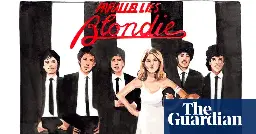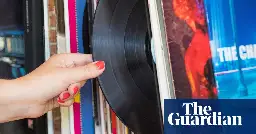Vinyl
- Coldplay: vinyl copies of new album Moon Music will be made from old plastic bottleswww.theguardian.com Coldplay: vinyl copies of new album Moon Music will be made from old plastic bottles
Band say carbon emissions for vinyl production will be reduced by 85% thanks to new method, as they announce 10th studio album

> Coldplay are aiming to make the most ecologically sustainable vinyl record yet, for their newly announced album Moon Music. > > Each 140g vinyl copy of Moon Music, released 4 October, will be manufactured from nine plastic bottles recovered from consumer waste. For a special “notebook edition”, 70% of the plastic has been intercepted by the environmental nonprofit The Ocean Cleanup from Rio Las Vacas, Guatemala, preventing it from entering the Gulf of Honduras and the Atlantic Ocean. > > The band say they will reduce carbon emissions compared with regular 140g vinyl production by 85%, and prevent the manufacture of 25 tonnes of virgin plastic. CD copies will be made from 90% recycled plastic, with a 78% reduction in emissions compared with traditional CD manufacture.
- Vinyl came back from the dead – and so did the bootleggers: inside the booming business of knock-off recordswww.theguardian.com Vinyl came back from the dead – and so did the bootleggers: inside the booming business of knock-off records
As LP sales boom in the UK, so has the illegal trade in poor-quality fakes. But the record detectives are fighting back

> Following the illegal vinyl trade – and the work of the people trying to stop it – can be both fascinating and very strange. The stories it produces mix mundane law enforcement with the names of hugely famous musicians. > > Four months ago, for example, I learned of a new investigation called Operation Typhoon, which was initially focused on a city in the Midlands. No one involved could say much about it, but parts of the story seemed familiar: the involvement of both the police and local trading standards officers, more records by Frank Ocean, and bone-dry announcements of each new discovery. “Intelligence will be shared with all the relevant parties, nationally and internationally,” said one official statement, “to locate the source of manufacture so that further action can be taken.” > > All I knew at first was that 529 records had been seized after a visit to another online business, and put into thick, clear polythene sacks, ready for forensic analysis. But then, early in the morning of 20 February, there was an apparent breakthrough. > > The latest raid had been carried out by the City of London police on “a three-storey industrial unit in west London”. What had been discovered included 5,000 albums (along with “inlay sleeves” and “disc centre labels”), by such artists as Kanye West and Drake, as well as old-school rappers De La Soul and Eric B & Rakim. The accompanying police statement said that the total street value of what had been seized was estimated at £1m. One man had been arrested, and then released under investigation. > > Illicit vinyl has been in circulation for as long as records themselves, but they last reached a peak of production between the mid-1960s and late-70s (circa 1964, counterfeit versions of the million-selling American album Introducing … the Beatles were reckoned to have outsold the official edition by three to one). Then, as now, what was produced often followed a predictable pattern: if an album by a successful artist was in short supply, ideally to the point of being considered collectible, then piracy would fill the gap. > > ... > > In the UK, British Phonographic Industry (BPI), the umbrella group that speaks for record labels, employs a small team of people who monitor the illegal sale of music, and do their best to stamp it out. In BPI’s view, it is “a serious crime that denies artists the rewards for their creativity, exploits fans, and impacts legitimate retail and the record labels that invest in music”. It also points out that the trade in illicit records sometimes blurs into money laundering and drug dealing. Between 2020 and 2022, BPI says it removed 43,000 fake records from online marketplaces, with a crudely estimated value of £860,000: factor in the tens – or even hundreds – of thousands of albums that presumably went unspotted and you get a sense of the mushrooming shadow industry that is trying to tackle.
- Vinyl records return to UK inflation basket for first time since 1992www.theguardian.com Vinyl records return to UK inflation basket for first time since 1992
Strong sales of Taylor Swift’s 1989 (Taylor’s Version) help format make an impact, as air fryers also join list

> Not since Simply Red’s album Stars topped the albums chart in 1992 have vinyl records been included in the basket of goods used to calculate annual inflation, but a rise in sales over recent years has brought them back as a marker of UK shop prices. > > The Office for National Statistics (ONS) said the “resurgence of popularity” in vinyl records meant they should be included among the 744 items used to calculate inflation each month, in its latest annual shake-up of the basket. > > Sales of vinyl were given an extra push in the UK last year by Taylor Swift’s album 1989 (Taylor’s version), which was the biggest-selling vinyl record, while the Rolling Stones’ Hackney Diamonds ranked as the highest-selling vinyl record by a British artist.